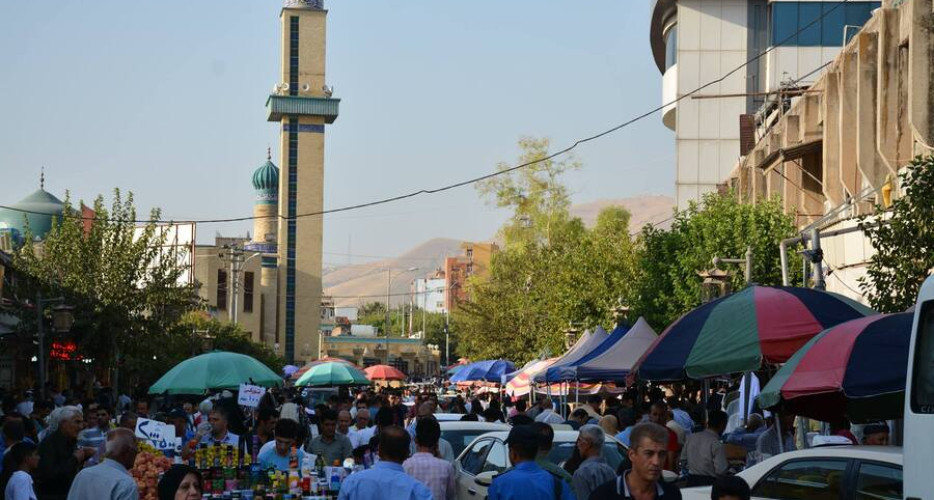
Peregraf- Ghamgin Muhammed
Markets across the Kurdistan Region remain crowded, yet shopkeepers say foot traffic doesn’t translate into sales. With government salaries unpaid for two consecutive months and fears of regional war mounting, consumers are cautious, anxious, and largely inactive.
This has become a familiar scene across many cities in the Kurdistan Region, where a growing economic crisis—driven primarily by delayed salary payments—is compounding public distress. Over 1.2 million public sector employees are still waiting for their May salaries, leaving markets stagnated and the population increasingly restless.
Salam Abdullah, a small shop owner in one of Erbil’s busiest food markets, stood behind his counter holding a piece of candy, more out of habit than appetite. "It’s late afternoon," he said. "And business is terrible. If things go on like this, I won’t even be able to pay my shop rent."
Rumors regarding May’s salary payment are nonexistent, fueling further frustration. The delay is a direct result of a financial deadlock between the Kurdistan Regional Government (KRG) and Iraq’s federal authorities over oil revenues and budget entitlements.
"The only hope now is a ruling by the Federal Supreme Court forcing the Ministry of Finance to release funds," Salam said. "But even that might take weeks."
"Being a salaried worker in Kurdistan means constantly worrying, constantly staring into empty pockets," said Sabiha Ahmad, a public employee. "We live just to cover basic needs and accumulate debt— scared stiff that even that won’t be enough. That’s all."
The salary crisis is part of a larger, long-standing conflict between the KRG and Baghdad, one that began in earnest in 2014 when the Region unilaterally started exporting oil. Since then, Baghdad has routinely withheld budget transfers, exacerbating economic hardship for KRG employees and destabilizing the Region’s economy.
"The situation is becoming economically and socially unsustainable," economist Khalid Haider told Paragraf. "The failure to pay salaries is not only a burden on workers—it disrupts the entire market ecosystem. Traders, shopkeepers, transporters—everyone suffers."
At a supermarket in Sulaimani, Sarbast Mariwan works the aisles and observes the emptiness. "In the past, when we offered discounts, customers would rush in and empty the shelves within hours," he said. "Now look—these discounted goods from before the holidays are still sitting here. No one has the money to buy."
He added that in a desperate bid to generate revenue, the store is planning to further reduce prices.
Beyond economic deadlock, regional tensions—particularly the recent escalation between Iran and Israel—have added another layer of anxiety. With airports closed temporarily and fears of a broader war looming, public sentiment has become even more cautious.
Despite these concerns, officials insist there is no food crisis. Nawzad Sheikh Kamil, Director General of Commerce for the Kurdistan Region, told Paragraf: "The flow of goods continues uninterrupted from neighboring countries. Our warehouses are full and, even in the event of an emergency, we have enough supplies to last for a year."
Still, that reassurance hasn’t been enough for many residents. "People here have lived through war and famine," said Khalid Haider. "Even when they hear reassurances, they don’t fully trust them. Some are even borrowing money just to stock up on essentials, putting themselves deeper into financial hardship."
He added that should the regional conflict escalate further, the ripple effects would impact both the Iraqi and Kurdistan economies severely.
In response to growing fears of inflation and price gouging, special committees have been deployed in cities and towns to monitor the market. "Any trader found hoarding food or manipulating prices will face legal action," said Nawzad Sheikh Kamil.
According to Mustafa Abdulrahman, head of the Kurdistan Importers and Exporters Union, the Kurdistan Region plays a vital role in Iraq’s trade. "Out of Iraq’s $20 billion annual trade with Iran, $6 billion comes through the Kurdistan Region," he said.
The Region maintains three key border crossings with Iran—Parwizkhan and Bashmakh in Sulaimani, and Haji Omeran in Erbil—and has even larger trade volumes with Turkey.
But without salary payments, no amount of trade can revitalize a frozen market. For many in the Kurdistan Region, survival has become a day-to-day struggle. And as crises stack upon crises, patience is wearing thin.